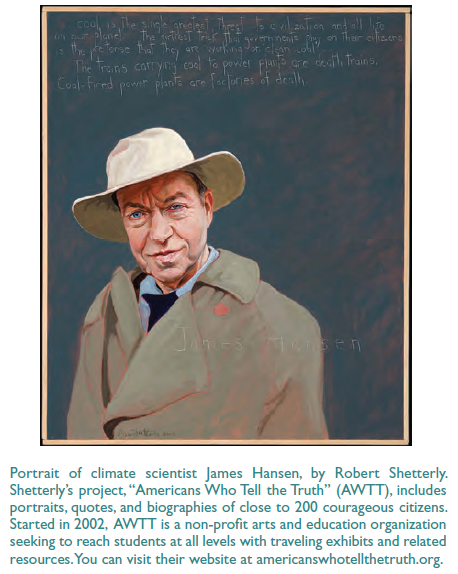Extreme Whether

When my dad, Neil Swanson, goes to rallies against the tar sands pipeline, people rush up to him and thank him for everything he’s doing. They don’t actually have any idea what a great guy my dad is. It’s just that his Scandinavian face looks a lot like James Hansen’s.
So, I already had a weird sort of family relationship to Hansen, whom I’ve never met, before I read Extreme Whether, a new play by the brilliant Karen Malpede that tells a personal story of Hansen in which everything is also political.
Hansen, of course, is the director of the NASA Goddard Institute for Space Studies and an outspoken advocate for putting a halt to global warming. Hansen warned Congress in the 1980s, revealed government deception in the 2000s, and has been speaking the truth, even more bluntly, if possible—and getting arrested for it—in recent years.
“Several times in Earth’s long history,” Hansen says, “rapid global warming of several degrees occurred. … In each case more than half of plant and animal species went extinct. New species came into being over tens and hundreds of thousands of years. But these are time scales and generations that we cannot imagine. If we drive our fellow species to extinction we will leave a far more desolate planet for our descendants than the world that we inherited from our elders. … And if you melt all the ice, sea levels will go up two hundred and fifty feet … producing a different planet.”
Hansen does not describe global warming as a mysterious ineluctable force, but as a policy choice made by certain powerful criminals (his word). This does not endear him to many in power, and the attacks on him are relentless, with New York Times business columnist Joe Nocera repeatedly denouncing him for hurting his own cause by being an activist, getting arrested, opposing the tar sands pipeline, and making “apocalyptic pronouncements”—never mind if they’re accurate.
Truth is not always stranger than fiction. Hansen’s story involves some pretty strange truths, but Malpede’s play adds emotional drama and strangeness aplenty. Hansen writes and speaks about his grandchildren and the fate we’re condemning all of our grandchildren to. Malpede imagines the life of a family in which Grandpa has figured out that the world is being destroyed but the world’s communications system works for the destroyers.
 The fictional family includes a climate scientist, his lover (also a climate scientist), his teenage daughter, his twin sister and her husband (denouncers of climate science), an uncle, a frog, and a piece of land. The uncle is dying, like the earth. The scientist’s wife has died from an illness diagnosed and acted upon too late. His lover has received a death threat. He has received death threats. The frog has grown six legs. The land has been polluted. The sister and her husband declare the earth in perfect health, while the scientist struggles with his situation.
The fictional family includes a climate scientist, his lover (also a climate scientist), his teenage daughter, his twin sister and her husband (denouncers of climate science), an uncle, a frog, and a piece of land. The uncle is dying, like the earth. The scientist’s wife has died from an illness diagnosed and acted upon too late. His lover has received a death threat. He has received death threats. The frog has grown six legs. The land has been polluted. The sister and her husband declare the earth in perfect health, while the scientist struggles with his situation.
Like a descendant of Cassandra, the Hansen character has spoken and has not been heard. Would better language have helped? Better charts? Was there a different way to say “the world is being destroyed” so as to make it understood before the world was destroyed? He has given up and ceased speaking publicly, but is mulling over the possibility of trying again, while his sister tries to silence him—or perhaps to entrap and belittle him. At the same time, the frog, a male, has been “feminized” by poisons in the environment, a process described as happening to young male humans as well.
And then eight years flash by, global warming gets hotter, the evidence begins to become apparent to non-scientists. But the denouncers of reality double down on their hostility toward recognizing that the earth has a problem. The struggle to speak truth to power continues through Act II, by the end of which we all have a strange family relationship with James Hansen, and each other, and all of our grandchildren. The trillions of future people whose future lives are being ruined by our coal and oil consumption are a statistic until we understand one of those trillions as a grandchild and a friend and a lover and a cousin and an aunt. Then the multiplication of that intensity of suffering by a trillion becomes almost impossible to comprehend, except perhaps with the aid of Malpede’s art.
